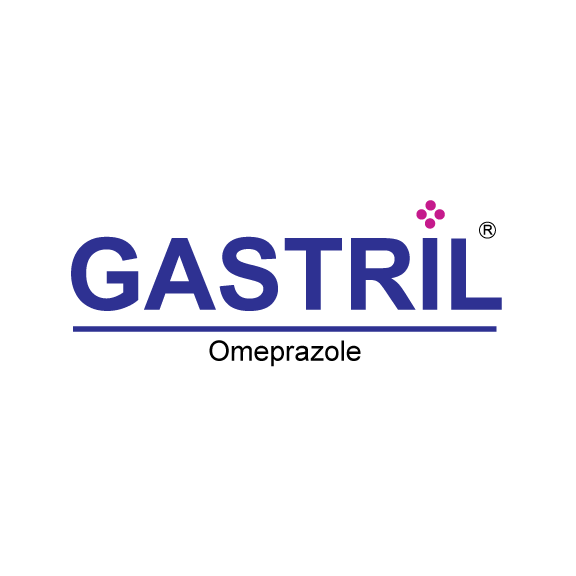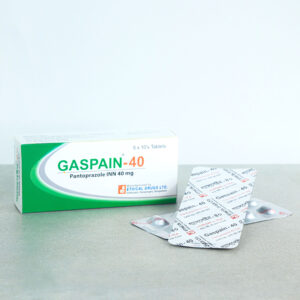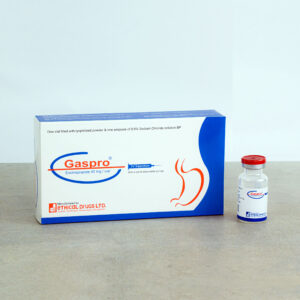GASTRIL®–Omeprazole BP
COMPOSITION
Available in 2 different dosage forms
Capsule: Each delayed release capsule contains 20 mg of Omeprazole.
Injection: Each sterile vile contains 40 mg of Omeprazole (as lyophilized powder of Omeprazole Sodium BP).
PHARMACOLOGY
GASTRIL® (Omeprazole) is a substituted benzimidazole that suppress gastric acid secretion by specific inhibition of the gastric acid proton pump (H+/K+ ATPase enzyme system) at the secretory surface of the gastric parietal cell. It blocks the final step of acid production. After oral administration, the onset of the antisecretory effect of Omeprazole occurs within one hour, with the maximum effect occurring within two hours and the duration of inhibition lasts up to 72 hours. The antisecretory effect lasts far longer than would be expected from the very short (less than one hour) plasma half-life, apparently due to prolonged binding to the parietal H+/K+ ATPase enzyme. Following absorption, Omeprazole is almost completely metabolized and rapidly eliminated mostly through urine.
INDICATION
GASTRIL® (Omeprazole) is indicated in the treatment of:
Heartburn
Any symptoms of GERD
Erosive esophagitis (both curative and maintenance therapy)
Duodenal ulcer
Gastric ulcers
Reduction of risk of upper GI bleeding in critically ill patients
Prophylaxis of acid aspiration
Reflux oesophagitis
Benign Gastric Ulcer
Zollinger-Ellison Syndrome
DOSAGE AND ADMINISTRATION
GASTRIL® (Omeprazole) delayed capsule should be taken one hour before meal.
Duodenal Ulcer: The adult dose for duodenal ulcer is 20mg GASTRIL® (Omeprazole) capsule once daily for 4 weeks. Some patients may require an additional 4 weeks of therapy.
Benign Gastric Ulcer: The usual dose is 20mg GASTRIL® (Omeprazole) capsule once daily for 8 weeks. In severe cases, the dose may be increased to 40mg once daily.
Reflux oesophagitis and Gastro-oesophageal Reflux Disease: The adult dose for severe erosive oesophagitis or poorly responsive gastro-oesophageal reflux disease is 20mg Gastril® (Omeprazole) capsule for 4 to 8 weeks.
Ulcer induced by NSAID: The recommended dose of 20mg Gastril® (Omeprazole) Capsule once daily for 4-8 weeks.
Acid reflux disease: For long-term management Gastril® (Omeprazole) 10mg once daily, increasing to 20mg capsule if symptoms return.
Acid-related dyspepsia: The usual dosage is Gastril® (Omeprazole) 10mg capsule or 20mg capsule once daily for 2-4 weeks depending on the severity and persistence of symptoms.
Eradication of Helicobacter pylori: Tripletherapy/dual therapy regimen of Gastril® (Omeprazole) 20mg/40mg capsule in combination with appropriate antibiotic can be used.
Zollinger-Ellison syndrome: 60mg Gastril® (Omeprazole) once daily. Dose may be increased to 120mg daily depending on the severity. Daily dosage of greater than 80mg should be administered in divided doses. Children: Children (over 2 years): 0.7-1.4mg/kg daily for 4-12 weeks; maximum 40mg daily.
Elderly: Dosage adjustment is not required in elderly patients.
Patients with impaired hepatic function: As bioavailability and plasma half-life is increased in patients with impaired hepatic function, the dose requires adjustment and a daily dose of 10-20 mg may be sufficient.
Patients with renal impairment: No dose adjustment is necessary in patients with impaired renal function.
GASTRIL® Injection should be administered according to the following instructions:
Prophylaxis of acid aspiration: GASTRIL® Injection to be given slowly, one hour before surgery.
Duodenal Ulcer, Gastric Ulcer, Reflux Oesophagitis: Once daily.
Zollinger-Ellison syndrome: Initial dose is 60 mg once daily. Higher daily doses may be required and the dose should be adjusted individually. When dose exceed 60 mg daily, the dose should be divided and given twice daily.
Children: Experience with treatment of children is limited. Omeprazole injection is therefore not recommended in children.
Elderly: Dosage adjustment is not required in elderly patients.
Patients with impaired hepatic function: As bioavailability and plasma half-life is increased in patients with impaired hepatic function, the dose requires adjustment and a daily dose of 10-20 mg may be sufficient. Patients with renal impairment: No dose adjustment is necessary in patients with impaired renal function.
Method of Administration
GASTRIL® Injection should be given as a slow intravenous injection. Reconstitute the contents in vial with 10 ml supplied diluent (No other solvent should be used). Discoloration may occur if incorrect reconstitution technique is used. After reconstitution the injection should be given slowly over a period of at least 2.5 minutes at a maximum rate of 4 ml per minute. Use only freshly prepared solution. Reconstituted solution is stable for up to 4 hrs. at 25˚c.
SIDE EFFECT
Omeprazole is well tolerated and adverse reactions have generally been mild and reversible. Side-effects may include headache, diarrhoea, constipation, abdominal pain, nausea/vomiting and flatulence, dizziness, paraesthesia, somnolence, insomnia and vertigo, increased liver enzymes, rash, dermatitis and/or pruritis, urticaria, Malaise. Others include hypersensitivity reactions e.g. angioedema, fever, bronchospasm, interstitial nephritis and anaphylactic shock.
PRECAUTION
Symptomatic response to therapy with Omeprazole does not preclude the presence of gastric malignancy. Immediate Release Omeprazole formulations contain sodium bicarbonate which should be taken into consideration for patients on a Sodium-restricted diet.
CONTRAINDICATION
Omeprazole is contraindicated in patients with known hypersensitivity to any components of the formulation.
DRUG INTERATIONS
Omeprazole can prolong the elimination of diazepam, warfarin and phenytoin drugs that are metabolized by oxidation in the liver. Monitoring and dose adjustment is recommended for the patients receiving warfarin and phenytoin in addition to Omeprazole. There is no evidence of an interaction of Omeprazole with theophylline, propranolol and antacids.
USE IN PREGNANCY AND LACTATION
Recent studies show no adverse effects of Omeprazole on pregnancy or on the health of the fetus or newborn child. Omeprazole can be used during pregnancy. Omeprazole is excreted in human milk. . Taking into account the importance of the drug to the mother, a decision should be made whether to discontinue nursing or to discontinue the drug.
COMMERCIAL PACKAGING
GASTRIL®: Capsules 20 mg: Each box contains 10 strips of 6 capsules in blister pack.
GASTRIL®: IV Injection: Each Combi pack contains 40 mg of Lyophilized Omeprazole Sterile Powder.












